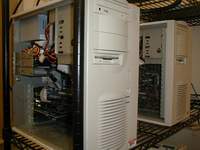

|
In order to
implement and test the possibility of running Portals over TNet
a set of 2 Alpha Workstations was installed at the Scalable Systems
Lab at UNM. |
 |
||
|
Introduction Part of this project was to setup the environment for the development from bottom up. This includes the procurement of the hardware (computers, network cards) and the installation of the software (OS, applications, drivers). The computers that have been chosen for the development system are Compaq Alpha workstations (164LX) because of two resons: first, at the begin of the project, TNet only ran under Tru64, an operating system by Compaq for their Alpha boxes - and second, Portals is actually used at Sandia National Laboratories on a Compaq Alpha cluster, the CPlant.
|
|||
Each systems is equiped with a 21164 alpha processor, a 4.5 GB UW-SCSI harddisk, 320 MB memory and a 100BaseT, Myrinet & TNet network interface card. The grafic controllers have been removed as these computers are not used as workstations. To access the BIOS and the main console when no network connection is available (rebooting system, testing new kernels, system message outputs) the 164LX supports tty’s on the first serial line. A PC based Linux box is used to remotely access the serial consoles by connecting the ports with a null modem cable. A telnet or SSH session to this Linux box followed by starting cu or minicom on the corresponding serial device will then redirect the main console prompt to the terminal emulation. This usually is known as terminal server.
In a first phase both systems are capable of booting either Compaq TRU64 (v 5.0 ) or RedHat Linux (v 6.2, kernel 2.2.14) by selecting the flags on the boot command in the SRM BIOS console (“boot” starts TRU64, “boot dva0 -fl 1” launches Linux). TRU64 was only installed to easily get familiar with TNet, including FCI, MPI and Cosmos to install it later on Linux for the project. If TRU64 is not longer used anymore, it is removed and the boot partition will hold the Linux kernel. The software development is entirely done under RedHat Linux and GNU C. To be able to start the programming from a working system, a mini CPlant using Myrinet and a TNet environment coexist under Linux. The tricky part is to apply the kernel patches that are needed for CPlant the way that the TNet modules are still insertable and the kernel remains stable. This two node development system now serves for any experimentation on Portals and TNet using a remote terminal. |
|||

